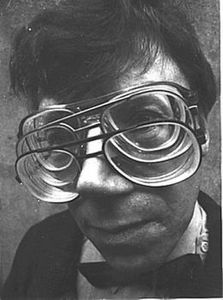Search
Recent
- Glasses Get High-Tech Part 3
- Glasses Get High-Tech Part 2
- Glasses Get High-Tech Part 1
- No optician required!
- Cheap Reading Glasses Bad For Eyesight
Popular
- No optician required!
- Glasses Consigned to History??
- Trends for 2010 and into 2011
- Which glasses suit my face shape?
Category
Archive
Glasses Consigned to History??
Category: Latest News
British researchers teamed up with colleagues around the world to pinpoint "variations" in DNA that make people more susceptible to myopia, the most common sight problem.
The breakthrough could lead to treatment in the next decade with eye drops or tablets that halt the distorted growth of the eyeball which causes the condition.
Shortsightedness is a relatively new but growing phenomena and as urbanisation and intensive education levels increase it is reaching epidemic proportions in some parts of the world.
Around a third of people in Britain are short-sighted, but in the Far East it is an even bigger problem, possibly because use of technology at an early age is more prevalent there. In Japan, two thirds of teenagers are already myopic and in Singapore, 80 per cent of 18-year-old male army recruits are short sighted, compared with 25 per cent just 30 years ago.
While watching television, reading and staying indoors is obviously having an effect, researchers knew that there was also a strong hereditary or genetic element to whether you succumbed.
In a study involving thousands of people around the world, including 4,300 in Britain, they searched for genes associated with degrees of myopia.
They found a number of variations around the RASGRF1 gene, which is associated with eye growth, seemed to be strongly associated with myopia - either preventing it or protecting against it.
Researchers now hope to be able to identify how exactly they affect the growth of the eye and then develop treatments that produce the perfect mix of genes.
In this way they should be able to prevent the eyeball distorting and therefore maintain 20-20 vision in most of the population.
"It is not quite the end of glasses yet but clearly the hope is that we will be able to block the genetic pathways that causes shortsightedness," said Dr Christopher Hammond at King's College London, an eye surgeon who led the British research.
"It will probably take the form of a tablet or eye drops but it is going to be a challenge and at least 10 years before there is a treatment."
The findings, published in Nature Genetics, will not be relevent to age-related longsightedness as this is to do with the eye muscles ability to focus and not to do with distortion of the eye ball itself. Reading glasses will still be needed for a while.
Are we worried? Not really.....



"Eye drops ?? But I'm allergic to RETINAX 5 !" (ST2-TWOK) ;-) At least we know what they'll name it : )